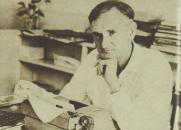After emigrating to Australia Alexander Turner spent much of his working life as a bank officer in rural Western Australian towns - notably Geraldton, Meekatharka, Pingelly and Carnamah. He also lived for a time in Perth. During his time in Geraldton he began sending verse to the Western Mail (Perth) and became involved in amateur theatre, eventually writing a number of plays. He later founded repertory societies in Meekatharra and Pingelly. His plays were staged in all three towns. Turner describes his association with the Carnamah Repertory Club in the 'Dedication' to Royal Mail and Other Plays. Some of his plays were also produced by amateur companies in Perth. In his Foreword to Hester Siding and Other Plays and Verse, Paul Hasluck notes that Turner acknowledged the support given him by various drama competitions, for which some of his plays won prizes, and also the encouragement from the Australian Broadcasting Commission (ABC), particularly the advice given by Frank Clewlow, drama director at the ABC, and Leslie Rees, then the ABC's play editor.
Turner enlisted at Geraldton during the Second World War and served in the Australian Imperial Forces (A.I.F.) between 1942 and 1946. After war service he worked for the ABC as a drama and feature producer. Writing of Turner as a dramatist Hasluck records:
His first stage plays ranged away from Australia in mood and subject. He was turning to his background to satisfy his feeling for deeper and warmer colours and more delicate shadows than he had yet found in Australia. His four stage plays printed [in Hester Siding and Other Plays] might be called English plays in the sense that his Australian surroundings had apparently little influence on their composition. In his radio plays he moves , at first rather uncertainly, away from the past. In Hester Siding the poet of his early verse again speaks. Listening to this play we feel the breath and hear the sounds of the countryside again ("Foreword").
Alexander Turner's career as a playwright for radio extended to thirty years; however, Paul Hasluck further notes that his ability as a poet was equally admirable. Hasluck praised the poetry as 'true songs of our countryside.'
 190902262769692758.jpg
190902262769692758.jpg
 190902262769692758.jpg
190902262769692758.jpg